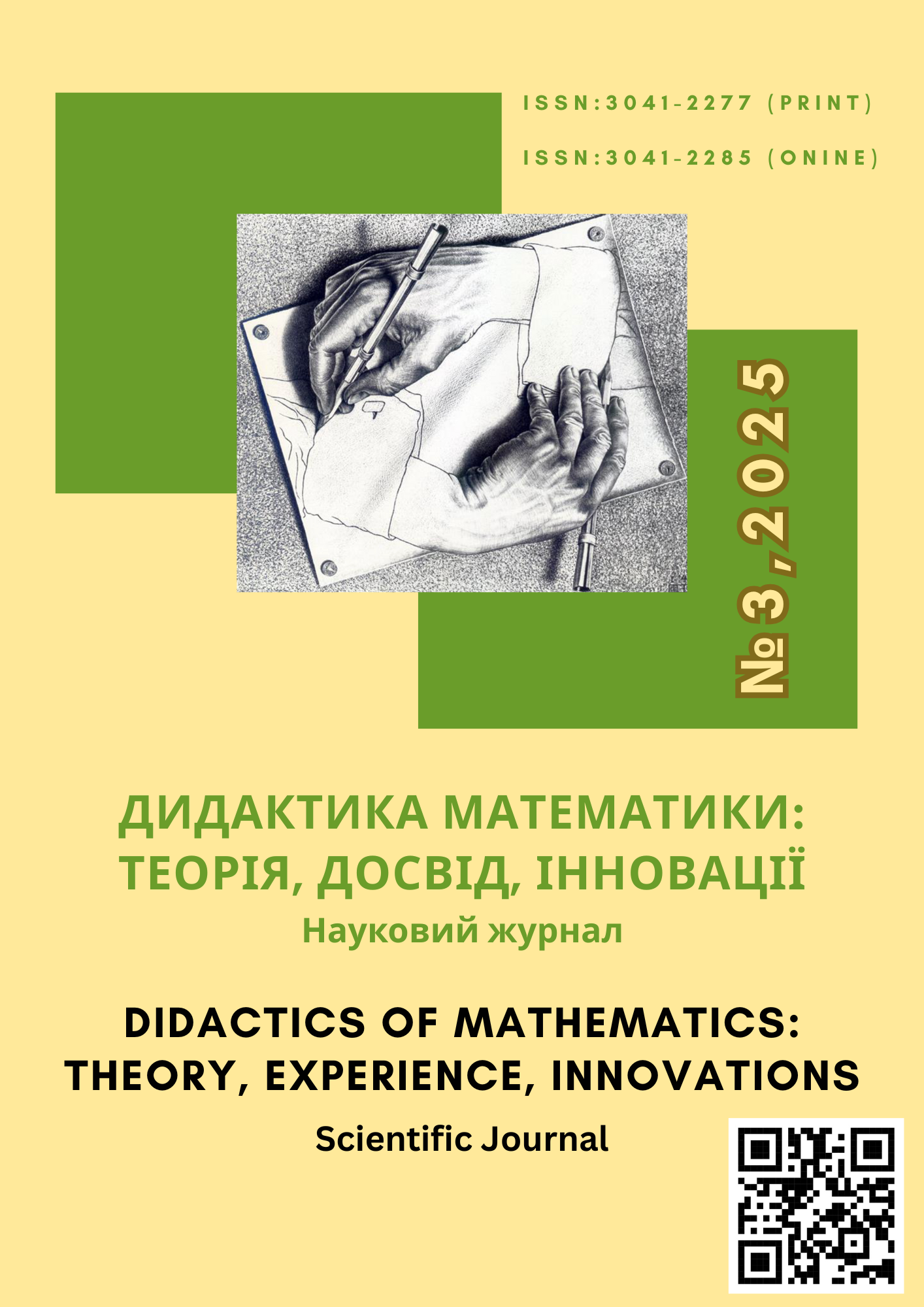Assessment of students' mathematics learning achievements: from official recommendations to everyday practice
https://doi.org/10.31652/3041-2277-2025-3-7-18Published 2025-07-15
Keywords
- mathematics education,
- New Ukrainian School,
- personal development,
- assessment by groups of learning outcomes,
- student learning assessment
- formative assessment ...More
Copyright (c) 2025 Любов Михайленко, Анна Остафійчук, Іван Хутченко

This work is licensed under a Creative Commons Attribution 4.0 International License.
How to Cite
Abstract
The article analyzes new approaches to assessing students' mathematics learning achievements in the context of implementing the New Ukrainian School (NUS) concept. Based on practical experience in pilot 8th-grade classrooms, the study outlines ways of implementing student learning outcomes assessment in accordance with the requirements of the State Standard for Basic Secondary Education, highlights its role in supporting students’ personal development, and identifies challenges and prospects of the new assessment system.
The purpose of the study is to analyze the features of implementing student learning assessment in mathematics within the framework of the NUS reform, to identify difficulties in applying official recommendations in daily teaching practice, and to outline pathways for methodological support of teachers.
Methodology. The research employs methods of analysis of regulatory documents, generalization of scientific studies and presentation materials, and systematization of teachers’ practical experiences shared during a roundtable organized by the NGO “Didactics of Mathematics.” Special attention is paid to the assessment by groups of learning outcomes and the use of formative assessment as a tool for developing mathematical competence. Scientific novelty lies in the presentation of current pedagogical experience related to the implementation of a new assessment system in mathematics education and the detailing of practical challenges at the school level. The article systematizes assessment approaches developed by teaching teams based on the principle of academic freedom.
Conclusions. The presented examples of implementing assessment recommendations demonstrate a high level of professional reflection and teachers’ readiness to seek optimal solutions even in conditions of limited methodological support. Overall, the new assessment system provides opportunities for a flexible, fair, and student-centered approach. However, its effective implementation requires extensive methodological guidance, resource support, and ongoing professional dialogue between science and school practice.
Downloads
References
- Букалов, Л., & Васильєва, Д. (2025). Формувальне оцінювання у навчанні математики: методичний посібник. Київ: Видавничий дім «Освіта». ISBN 978-966-983-580-2 (ел.)
- Дворецька, Л. П. (2022). До питання оцінювання навчальних досягнень учнів Нової української школи в системі внутрішнього контролю якості освіти в закладі загальної середньої освіти. Матеріали 5-ї Міжнародної науково-практичної конференції “Eurasian scientific discussions” (5-7 червня 2022 р.), Барселона: Barca Academy Publishing, 410–416. ISBN 978-84-15927-32-7.
- Істер, О. С., & Істер, Д. О. (2025). Геометрія: самостійні та діагностичні роботи. 8 клас. Київ: Генеза.
- Матяш О.І., Тютюнник Д.О. (2019). Проблема визначення критеріїв та показників математичних компетентностей набутих учнями у процесі навчання геометрії. Фізико-математична освіта, Випуск 20(2), 89–93. https://doi.org/10.31110/2413-1571-2019-020-2-014
- Міністерство освіти і науки України. (2024, серпень 2). Про затвердження рекомендацій щодо оцінювання результатів навчання: Наказ №1093.
- Міністерство освіти і науки України. (2025, березень 14). Про окремі питання оцінювання результатів навчання: Лист №1/4895-25.
- Михайленко, Л. (2022). Сучасні підходи до впровадження формувального оцінювання на уроках математики. Фізико-математична освіта, 37(5), 43–49. https://doi.org/10.31110/2413-1571-2022-037-5-006
- НУШ Математика 7 клас. (2024). Збірник робіт для формувального та підсумкового оцінювання / Школьний, О. В., Нелін, Є. П., Простакова, Ю. С., Миляник, А. І. Харків: Ранок.
- Онопрієнко, О. В. (2020). Інструментарій оцінювання результатів компетентнісно орієнтованого навчання молодших школярів: методичний посібник. Київ: КОНВІ ПРІНТ. https://lib.iitta.gov.ua/id/eprint/722959/1/ПОСІБНИК_Онопрієнко.pdf
- Онопрієнко, О. (2022). Modern forms and methods of control and evaluation of the primary schoolchildren's educational achievements. New Inception, 4, 22–29. https://doi.org/10.5281/zenodo.5972417
- Оцінювання в 5–9 класах НУШ: відповідаємо на запитання. (н.д.). https://mon.gov.ua/news/otsiniuvannia-v-59-klasakh-nush-vidpovidaiemo-na-zapytannia
- Простакова, Ю. С., & Вітковська, О. І. (2022). Особливості оцінювання навчальних досягнень учнів в 5 класі з математики в умовах реалізації концепції «Нова українська школа». У Наумовські читання: матеріали ХІХ наук.-метод. конф. здобувачів вищої освіти та молодих учених, Харків: ХНПУ імені Г. С. Сковороди, 94–97. https://dspace.hnpu.edu.ua/handle/123456789/8008
- Тадеєв, П., & Тадеєва, М. (2024). Форми і методи оцінювання результатів сформованості операційних та практичних умінь учнів наукових ліцеїв (вітчизняний та зарубіжний формат). Духовність особистості: методологія, теорія і практика, 1(1), 215–230. https://doi.org/10.33216/2220-6310/2024-108-1-215-230
- Didactics of mathematics. (н.д.). Google Sites. https://sites.google.com/view/mathdidactics/головна-сторінка
- Nortvedt, G. A., & Buchholtz, N. (2018). Assessment in mathematics education: responding to issues regarding methodology, policy, and equity. ZDM Mathematics Education, 50, 555–570. https://doi.org/10.1007/s11858-018-0963-z

